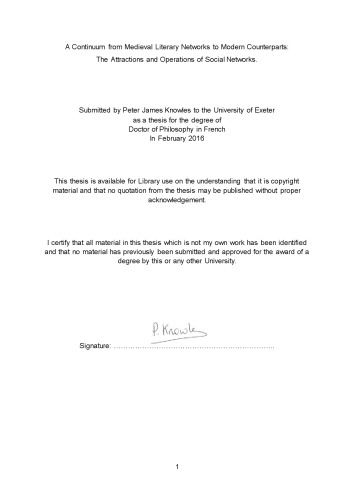Product desciption
A Continuum From Medieval Literary Networks To Modern Counterparts The Attractions And Operations Of Social Networks Peter James Knowles by Peter James Knowles instant download after payment.
While the benefits of analysing social networks within the wider humanities
are becoming more accepted, very little work of this kind has been done in medieval studies. This thesis seeks to begin to fill this lacuna by considering the advantages of examining historical moments through the lens of ‘network’. Focusing on the later medieval world (in particular c.1300-1520), but also drawing on parallel evidence from the modern day, it demonstrates how the paradigm of ‘network’ allows a more nuanced reading of, predominantly literary, historical moments, which in turn reveals a deeper understanding of collective social thinking and behaviour. This new methodological approach is threefold, drawing on analytic tools from various disciplines. It blends historical contextual investigation with literary analysis, and frames the results in the sociological and anthropological theories of belonging, exchange, and play.
The thesis is structured around four case studies, each of which demonstrates a particular form of network formation, and also shows how far these networks reflect their respective cultural milieus and influences. Three medieval chapters focus on what I term ‘literary networks’, a concept ripe for network analysis thanks to the highly participatory nature of medieval literature, and thus theoretically comparable to modern networks based around information exchange. Across the thesis, instances of formal, informal, and virtual networks are considered from medieval France and England, as well as the twenty-first century West. This combination of interdisciplinary method and structure allows innovative new readings of underappreciated sources, whilst also highlighting a transhistorical continuum of universal appeals to social networks: namely, the satisfaction of the human need to belong, the facilitation of competitive play, and the opportunity to acquire social capital and build reputations. This investigative synthesis between medieval material and more modern network evidence reveals that, while realised through unrecognisably altered technologies and experiencing some resultant disruptions, these fundamental appeals of social network membership, in part, remain constant between the two periods.


